new posts in all blogs
Viewing Blog: , Most Recent at Top
Results 1 - 25 of 82
Statistics for
Number of Readers that added this blog to their MyJacketFlap:
By: frankramer,
on 11/19/2014
Blog:
(
Login to Add to MyJacketFlap)
JacketFlap tags:
dreams,
Uncategorized,
dream,
dream journal,
dreamwork,
healing dreams,
dream journaling,
working with dreams,
On Dreams,
benefits of remembering dreams,
Dreamwork Methods,
dream healing,
evaluating dreamwork,
lucid dream,
progress in dreamwork,
Add a tag
When my students do dreamwork (the recording and working with dreams to learn something from the dreams) on a regular basis, what I sometimes get asked is this: How do I know I am making progress in working with dreams?
This is a good question, because unless I am working with someone who knows a lot about dreamwork such as a dream mentor, the answers may not be all that apparent, especially in the beginning. However, in the long run, progress will definitely become more obvious because of the positive changes the dreamer will see in his or life.
Indicators of progress in dreamwork can be seen in the following:
- Dreams become more vivid and easier to remember. A beginner usually has difficulty remembering dreams. Just having the intention to remember dreams will often prompt the dreamer to remember his or her dreams. Need help in remembering dreams? See Tried and True Tips to Better Remember Your Dreams at http://wp.me/p45aiq-5B
- Dreams seem to “come” when one needs or wants them. Just making the intention to do regular dreamwork or participate in a dream class will often encourage the psyche to offer the dreamer a sudden outpouring of dreams.
- Discovering that dreams do respond to requests for information and wisdom with appropriate insights. Asking for a particular dream (Dream Incubation) and getting a helpful answer is truly empowering for the neophyte starting the study of dreams. It’s like meeting a powerful helper for the first time. This experience gives the dreamer confidence to ask for more help from dreams. For information on incubating a dream see Ask and You Shall Receive: Incubating a #Dream at http://wp.me/p45aiq-71
- Experiencing a lucid dream. A lucid dream is one in which the dreamer feels like he or she is awake and aware in the dream, all the while knowing it is a dream. Conscious choices can be made within the dream. One feels one can create the dream. Like dream incubation, this is an empowering to the dreamer. Lucid dreams can be also be requested for or intended in order to heal, problem solve or gain information.
- Experiencing healing, a solution or guidance in a dream or through information received in a dream.
- Discovering and evaluating what contributions dreams have made. After recording dreams for a significant period of time, one can go back and review dreams to find how they related to events and experiences in waking life during that time. This can be an eye-opening experience of discovery when one sees that many dreams do come true, show the processes and transformations one is going through in life, and support and nurture the dreamer from a deeper source.


By: frankramer,
on 11/12/2014
Blog:
(
Login to Add to MyJacketFlap)
JacketFlap tags:
dreams,
Uncategorized,
dream,
soul,
dream journal,
dreamwork,
dream journaling,
working with dreams,
benefits of remembering dreams,
Dreamwork Methods,
Polls on Intuition,
Dreams and visions,
Lissa Rankin,
loss of soul,
role of dreams in spirituality,
soul in dreams,
soul loss,
Add a tag
Do you feel out of touch with yourself? Do you feel that your culture is shallow and vapid? You are not alone. In 20 Diagnostic Signs That You’re Suffering From “Soul Loss,” Lissa Rankin, M.D., states that this is a very common malady in today’s world. She says not only individuals suffer from this but so do cultures. In my opinion, religions, and in particular, churches can also suffer from it. Whenever we, whether individually or collectively, have lost sight of what animates us, what makes us come alive or what drives us, we suffer from a form of soul loss.
Dreams and holding on to a dream are some keys to recover the soul’s enlivening power in our waking life. Dreams come from the soul itself and speak for the soul and its needs. It is no wonder that so many individuals suffer soul loss when they don’t value their dreams and don’t make an effort to remember them or work with them. Institutions lose soul when they lose sight of the founder’s vision or dream for that organization. This is particularly true of religions and churches which become social clubs or babysitting stations for kids when the ties to a deep spiritual connection have been broken or not promoted among the followers.
Therefore, a remedy for recovering from soul loss is studying about dreams, learning both how to work with them and learning from them:
Individually, this means keeping a dream journal and doing dreamwork on an on-going and consistent basis.
Collectively, this means studying and learning from the dreams and visions of the founders. Institutions can recapture their original dynamism by going back to the basics, to be once again inspired by the founders, learning what defined the organization and why it was started in the first place.
Dreams and visions are all about purposes of soul and how soul presents itself in the world. What is your true dream? In that you will find your true inspiration.


By: frankramer,
on 11/5/2014
Blog:
(
Login to Add to MyJacketFlap)
JacketFlap tags:
dreams,
Uncategorized,
spirituality,
bible,
dream,
Religion and Spirituality,
dreamwork,
working with dreams,
On Dreams,
Dreamwork Methods,
dreams in the bible,
dreamwork as spiritual methodology,
Joseph's dreams,
Add a tag

In Dreams: A Way to Listen to God Morton Kelsey says, “…the Church has developed no theory that can bring the spiritual world closer to human beings.” This is a powerful statement. One would think that it would be a primary function of Christian religions to do this. Instead, the mainline Christian churches have traditionally offered biblical and theological studies which provide intellectual and cultural understandings of Christianity, but have moved away from experiential forms of spirituality which might let us personally “taste and see” the glory of God. I think this is one reason so many people have left mainstream Christianity to explore yoga, meditation and other experiential approaches to connecting to something greater. Yet, as Kelsey points out in his book, dreams have always been part of the Judeo-Christian tradition, and he heartily recommends using them as a spiritual methodology to bring the spiritual world closer to us.
It’s not like the spiritual world isn’t trying to contact us. It does so nightly in our dreams! But how few people make an attempt to remember their dreams, and of those who do, how few make it a practice to honor, record, reflect and learn from their dreams?
One only has to pick up a Bible and see the frequent references to dreams and the important role they played in shaping people’s lives. People who could interpret dreams, like Joseph and Daniel, were held in high esteem because it was thought that God spoke through dreams. In the Bible, the information received in dreams is shown to be very important such as in predicting times of flood or famine or helping a person in need. Joseph, the husband of Mary, was one of many who received an important message in a dream. He was told to not worry in taking Mary as his wife since the child she had conceived came in a most unusual way. All these characters in the Bible worked with and let dreams shape their lives—even when their lives depended upon it.
Perhaps, if we let God into our lives through our dreams, our lives would take on a much greater meaning and significance compared to the trivial and myopic views we hold in an uninformed waking life that is often driven by the demands of others as well as egoistic and material needs.


By: frankramer,
on 10/28/2014
Blog:
(
Login to Add to MyJacketFlap)
JacketFlap tags:
Uncategorized,
dream,
insight,
dream journal,
recording dreams,
intuitive insight,
dreamwork,
dream journaling,
working with dreams,
On Dreams,
benefits of remembering dreams,
Dreamwork Methods,
insights from dreams,
Add a tag
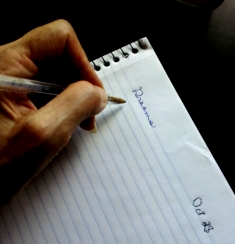
Recording Dreams
Dreamwork is the practice of regularly recording and reflecting on one’s dream in a conscious and applied manner with the intention to learn from the wisdom of dreams. It is not an easy task. In fact, it is probably one of the most challenging projects a person could take on, and yet, possibly one of the most rewarding.
Freud said dreams were “the royal road to the Unconscious.” Connecting to dreams is a direct method to connect to the Unconscious, the deepest part of you. So if you want to really get to know yourself through and through, doing dreamwork is one of the best ways to do it.
By committing to dreamwork, you are giving permission to the Unconscious to inform your waking life, bringing new and often challenging insights into a consciousness that is often protected from this greater reality by a tough Ego that wants to be safe, secure and in control. Often, the interests of Ego and the interests of Unconscious are at odds. This means:
- You may experience conflicting values in situations where your ego has learned to adapt, appease, turn a blind eye or, conversely, be overly critical and your Unconscious is suggesting a bolder, risky or more loving response.
- You may be presented with information about a situation you would rather not know. Dreams often can see the bigger picture and give information you do not pick up in waking consciousness or they may portend events in the future that may be hard to accept.
- Dreams may show you how powerful you can be if you forgo your fears and act on your dreams. Dreams may show you doing things in dreamtime you are frightened to do in your waking life—but in dreamtime accomplish with ease, grace and sometimes with the help of angelic beings. This is why the phrase “If you can dream it, you can do it” is so true. It’s like the holographic prototype model has already been tested in dreamtime, proving to you it can work.
By committing to dreamwork, then, you are committing yourself to be open to another level of awareness that calls you to move beyond the constraints of Ego limitations and into a world of limitless possibilities. What can be more exciting than that?


By: frankramer,
on 10/22/2014
Blog:
(
Login to Add to MyJacketFlap)
JacketFlap tags:
dreams,
Uncategorized,
dream,
dream journal,
dreamwork,
dream journaling,
On Dreams,
prophetic dreams,
benefits of remembering dreams,
Dreamwork Methods,
foreknowledge,
dream information,
Hippocrates,
manifesting dreams,
surrealistic,
Add a tag
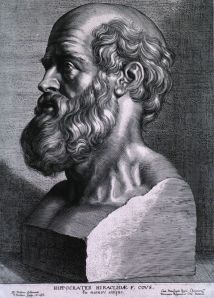
Hippocrates of Kos taught about dreams indicating illnesses.
If you faithfully keep a dream journal you will notice, over time, many things and events that you dream about come true in waking life. It may be the sequence of events that particularly manifest or it may be that you see a person in dreamtime you never met before–but several months after the dream you meet that person in waking life. Then there are some dreams that don’t appear to have any relationship to current reality or seem so bizarre and surrealistic that it doesn’t seem they could ever be making a true statement about anything.
This raises the question of how do you know if a dream might manifest in waking life? From nearly forty years of dreamwork, I have made these observations about my own dreams. You might see if they apply to your own.
- Very realistic dreams tend to manifest in waking life. If I have a dream that is realistic and probable, i.e., I am driving my own car and not some fantasy car, then it probably has something to do with manifesting something in waking life. For example, any physical ailment which I knew about ahead of time in dreamtime presented quite literally and showed up later on a medical test as when years ago I had a dream in which a voice said I had blood in my stool. A medical test actually concurred with that even though a later colonoscopy proved it was nothing to worry about. This rule applies also in cases where the symbolism is present but there is a clear resemblance such as dreaming of having overflowing pipes and end up having diarrhea. This is possible because there is a close proximity to the symbol and waking reality. In fact, Hippocrates, the father of modern medicine, said much medical and diagnostic information of this sort could be gained from similar dreams.
- Somewhat surrealistic or unrealistic events may be relating events in the far off future. Years ago I had a series of dreams in which I was traveling around Hawaii with my brother. At the time I was living in Massachusetts, and so the possibility of this happening seemed a little far-fetched. The island’s scenery was stylized in my dream, not being typical of a specific place on any of the islands. Yet, as I read my dream journal years later, I found that after I moved to Hawaii, we did travel around the island of Oahu as we did in the dream, and we shared certain concerns that showed up in those early dreams.
- Very surrealistic dreams tend to be making a statement about the interior world of the dreamer. Really bizarre, odd or unusual objects in places they don’t usually belong, such as a rare or extinct species of owl in a refrigerator, are most often aspects of the dreamer and need to be looked at as such by asking, “What about me is like this owl?” or “What about me is like the refrigerator?” In this type of dream, I personally have not seen a close or frequent connection to events or objects manifesting in waking life such as opening the refrigerator and finding a rare spotted owl perched next to the orange juice.


By: frankramer,
on 10/14/2014
Blog:
(
Login to Add to MyJacketFlap)
JacketFlap tags:
dreams,
Uncategorized,
muse,
dream,
lover,
dream talent,
Dead Men Do Tell Tales,
characteristics of intuition,
dreamwork,
healing dreams,
working with dreams,
On Dreams,
benefits of remembering dreams,
Dreamwork Methods,
common dream theme,
dream lovers,
lover in a dream,
Add a tag
Meeting and possibly making love with a very attractive person in a dream is a quite common dream theme, no matter whether it is someone we know in waking life or a mysterious lover who only populates our dreams. In the dream, these encounters are often marked by passion, beauty, and wonder so vivid that upon waking we feel driven to act on the dream—no matter if the person is someone in waking life who is unavailable, a poor choice or someone we don’t know or haven’t even encountered yet!
The importance of the dream is not so much the person referred to but the energy that is evoked in the dream. Powerful energy does, indeed, need acting upon and that is what the dream is asking us to do. However, before going and doing something foolish or regrettable, the thing to remember is that the dream is all about the dreamer. That highly attractive and lovely soul you are encountering is perhaps an aspect of your own loveliness or quality, and it is that which is asking you to recognize in yourself!
Example:
In the dream you are falling for a writer who is physically attractive and highly competent as a writer. Before you go associating this person with someone you know who is a writer, you might ask yourself: Have you thought about becoming a writer? Do you have writing skills you haven’t developed? If so, this dream perhaps is telling you that the profession would be attractive to you and that you would be competent at it! It is like your muse inviting you to this possibility.
If you actually know a writer in waking life that you think this dream symbol represents, you may want to pursue the relationship in real life if the person is available emotionally or otherwise. That person may have a lot to teach you about writing and life itself. The good news is that if this person is a jerk in waking life, or is married with three kids, or you are married, you can still nurture that wonderful energy by recognizing that it is part of you—you can value it by learning about the craft of writing, starting writing, and getting feedback on your writing. Your love will blossom to fruition with the development of a whole new aspect of yourself and you will have avoided a possibly disastrous relationship!


By: frankramer,
on 10/7/2014
Blog:
(
Login to Add to MyJacketFlap)
JacketFlap tags:
Uncategorized,
father,
dream,
dad,
intuitive,
dreamwork,
working with dreams,
On Dreams,
Dreamwork Methods,
dream symbol,
dad in dreams,
dream dictionary,
dreaming of dad,
dreams of father,
father in dreams,
Add a tag
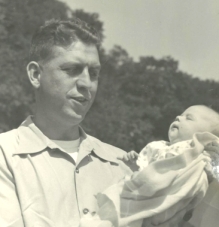
Dreaming of One’s Father
The appearance of the father in a dream is one that is loaded with significance because of the rich and deep associations, perhaps very negative or very positive, with our experience of having a father. My own long relationship with my father was one of the richest (full of ups and downs) and best and most supportive in my life so this week when I had the unusual occurrence of two dreams about him around the 8th anniversary of his death I decided to take a closer than usual look at this powerful dream symbol.
Look for Personal Associations
I first looked at my personal association the father symbol. Reflecting on this symbol made me realize first and foremost the supportive and caring association I had with my father. So his image in the dream represents for me caring and supportive energy that is near me now, even though he has passed.
Look for Conventional Associations
I next perused various dream dictionaries for the usual explanations of the symbol of the father. Depending on the dream dictionary, there were often many and varied meanings ranging from the father being a symbol of power, authority, and the law to being a harbinger indicating difficult times were coming and that one should seek wise advice.
Reflect More Deeply
When I research various meanings like this, I consider it a form of brainstorming. I am not ready to accept the answers I find at face value. I just want to see all the general associations with the father out there, perhaps coming across some I haven’t seen before. While doing this, I look for any of these to have a meaning that resonates with me, an association that might feel like it has a meaning tailored for me in my specific dream. I ran across one such meaning I hadn’t seen before and it resonated. A dream about the father, in Arabic and Islamic traditions, and found at http://dreamingthedreams.com/meanings/Father/ means help for a waking issue will come from sources one doesn’t anticipate.
Stick to the Feelings in and Generated by the Dream
This meaning was valid specifically for me because it connected the feelings in the dream and those generated by the dream with what has been going on in my life. In both dreams, my father was feeling confident and happy. He wasn’t trying to warn or help me, which means that part of me in the dream that is represented by my father is apparently happy and satisfied! This is odd because recently I have made a risky career choice my father wouldn’t necessarily have approved of when he was living, which is resulting in a situation where I need help but from sources I can’t imagine. I have tried all the usual solutions and sources I know of and none have yet worked; however, other dreams of mine indicated that help will come—even though the source was not revealed. When I read this last interpretation of help coming from unexpected sources, it tied all the meanings and feelings together and comforted me.


By: frankramer,
on 10/1/2014
Blog:
(
Login to Add to MyJacketFlap)
JacketFlap tags:
disrespect of self,
dreams,
Uncategorized,
dream,
intuitive,
self-respect,
self-destructive behavior,
negative behaviors,
intuitive insight,
Intuitive insights,
working with dreams,
On Intuition,
Intuitive Methods,
On Dreams,
benefits of remembering dreams,
Dreamwork Methods,
Meditation Methods,
dream healing,
Add a tag

Where Does Self-Respect Come From?
5 Signs You’re Not Respecting Yourself by Vironika Tugaleva is a good article about the negative behaviors that can pull us down, indicating that our self-esteem is plummeting. If these behaviors become habitual patterns they can be very self-destructive and undermine our relationships with other people.
Usually these behaviors manifest because, for any number of reasons, we are not in touch with our true self, and so don’t respect who we are. Dreamwork and accessing intuitive insight are great tools that can counteract any tendency to disrespect ourselves because the on-going practice of these exercises can lead to a healthy awareness of who we truly and uniquely are at the deepest emotional and spiritual levels. These exercises tap us into the root of our being and nourish us with information that gives the bigger picture, the grander vision and the substance of things. They can also give us specific answers to problems and concerns we may have. Instead of being buffeted around by the questionable and often enslaving pressures and opinions of those around us, we are fed by healing truths that are custom made for each of us in a way that meets the problem at hand while preserving our innate goodness and integrity. The end result is that we can behave in a manner that is worthy of respect, both from others and from ourselves!
Example: When I start to feel jealous of someone’s life, thinking it is better than mine, I can ask for a dream will give me guidance on how I can get more out of my own life, being very specific in the questioning to indicate what makes me jealous of someone else and what I might need to fulfill my own life. Asking for a dream to help resolve an issue is called incubating a dream (Ask and You Shall Receive: Incubating a Dream), and it can become one way to work through an issue.
The same can be done by an intuitive meditation such as the Inspired Heart™ Meditation. Prior to doing the meditation I can ask for insight to come. During the meditation I observe the breath and quiet the mind. I then make a heart connection, and receive the insight that comes.
No matter if I work with a dream or in a meditation, the occasion may become a turning point in my life that encourages me to face my feelings, and work towards resolving my issues based on information I have received from a profound inner source and not someone’s opinion or outside pressure. With regular practice I will find that such empowerment will lead to a healthy self-respect. I will come to experience that I am a Child of God, fed and cared for by divine sources, and placed on this earth for an important purpose that only I can serve. What better basis for self-respect can there be?


By: frankramer,
on 10/1/2014
Blog:
(
Login to Add to MyJacketFlap)
JacketFlap tags:
dreams,
Uncategorized,
dream,
intuitive,
self-respect,
self-destructive behavior,
negative behaviors,
intuitive insight,
Intuitive insights,
working with dreams,
On Intuition,
Intuitive Methods,
On Dreams,
benefits of remembering dreams,
Dreamwork Methods,
Meditation Methods,
dream healing,
disrespect of self,
Add a tag

Where Does Self-Respect Come From?
5 Signs You’re Not Respecting Yourself by Vironika Tugaleva is a good article about the negative behaviors that can pull us down, indicating that our self-esteem is plummeting. If these behaviors become habitual patterns they can be very self-destructive and undermine our relationships with other people.
Usually these behaviors manifest because, for any number of reasons, we are not in touch with our true self, and so don’t respect who we are. Dreamwork and accessing intuitive insight are great tools that can counteract any tendency to disrespect ourselves because the on-going practice of these exercises can lead to a healthy awareness of who we truly and uniquely are at the deepest emotional and spiritual levels. These exercises tap us into the root of our being and nourish us with information that gives the bigger picture, the grander vision and the substance of things. They can also give us specific answers to problems and concerns we may have. Instead of being buffeted around by the questionable and often enslaving pressures and opinions of those around us, we are fed by healing truths that are custom made for each of us in a way that meets the problem at hand while preserving our innate goodness and integrity. The end result is that we can behave in a manner that is worthy of respect, both from others and from ourselves!
Example: When I start to feel jealous of someone’s life, thinking it is better than mine, I can ask for a dream will give me guidance on how I can get more out of my own life, being very specific in the questioning to indicate what makes me jealous of someone else and what I might need to fulfill my own life. Asking for a dream to help resolve an issue is called incubating a dream (Ask and You Shall Receive: Incubating a Dream), and it can become one way to work through an issue.
The same can be done by an intuitive meditation such as the Inspired Heart™ Meditation. Prior to doing the meditation I can ask for insight to come. During the meditation I observe the breath and quiet the mind. I then make a heart connection, and receive the insight that comes.
No matter if I work with a dream or in a meditation, the occasion may become a turning point in my life that encourages me to face my feelings, and work towards resolving my issues based on information I have received from a profound inner source and not someone’s opinion or outside pressure. With regular practice I will find that such empowerment will lead to a healthy self-respect. I will come to experience that I am a Child of God, fed and cared for by divine sources, and placed on this earth for an important purpose that only I can serve. What better basis for self-respect can there be?


By: frankramer,
on 9/24/2014
Blog:
(
Login to Add to MyJacketFlap)
JacketFlap tags:
discussing dreams,
dreamwork,
working with dreams,
On Dreams,
Dreamwork Methods,
dream symbolism,
dream is about the dreamer,
awakening of consciousness in dreams,
dream information,
energy in dreams,
dreams,
Add a tag
Chances are someone told you, “I had a dream about you.” All of us dream during sleep and we often dream about people we know personally. Since many people remember their dreams, they may mention a dream about you, even if it is weird, sexual or frightening. In these cases, the dream conversation can be unsettling to both the dreamer and the one dreamed about. For example, let’s say that Tom is a project manager who supervises a technician named Raymond on a big project. Tom has the following dream which he relates to Raymond:
Tom sees Raymond wearing Superman’s attire and flying over tall buildings.
Responding to Dream Information
On hearing this dream, Raymond, on one hand, feels happy about the dream because it seems to reflect that his boss holds him in high esteem, feeling he can do anything. On the other hand, it makes Raymond uneasy because they both are about to start a really challenging project, and Raymond wonders if he can live up to his supervisor’s unrealistic imagery of his abilities. If Raymond is interested in pursuing this remark to get better insight into his boss and their relationship, he might say something like, “It sounds like you think I am very capable. Thanks for your confidence in me. While I always try to do my best, remember I’m not Superman. ” That’s probably as far as most people would take the conversation. Added insight can be gained, however, if the person being dreamed about understands:
- You Can’t Interpret Another Person’s Dream
- The Dream is About the Dreamer
- The Dream Has Many Levels of Meaning
Raymond needs to understand that you can’t interpret another person’s dream. The dream is about the dreamer, in this case Tom. The key to understanding the dream is to understand what Raymond means to Tom, and if Tom isn’t willing to share this perception, Raymond really can’t know the real or full meaning. Raymond may get clarification on the dream by asking, “Do you really have such a high opinion of what I can do?”
While the dream may mean that Tom does have a high opinion of his technician, Raymond, and thinks he can tackle many tasks; however, on a deeper level, it may also mean that Tom has been feeling uncertain about tasks he needs to accomplish and he is using Raymond’s abilities as the standard for excellence. At a still deeper level, and taking the dreamwork method of all things in the dream are part of the dreamer, the dream may also symbolize some issue or new awareness that only belongs to Tom, having little to do with Raymond personally. Perhaps Tom realizes he is getting better at tackling the technical aspects of his own job. Tom’s perception of Raymond may have been the catalyst to awaken this new and powerful energy within himself! By comparing himself to his able employee, Tom realizes he, too, can soar.
So while Raymond may take his supervisor’s dream as a compliment, Raymond should not make too much of his supervisor’s dream in thinking it pertains just to him. More than likely, it also has to do with something new happening within Tom, and if Raymond is sharp he will be on the lookout to see changes in his boss.


By: frankramer,
on 9/24/2014
Blog:
(
Login to Add to MyJacketFlap)
JacketFlap tags:
Add a tag
Chances are someone told you, “I had a dream about you.” All of us dream during sleep and we often dream about people we know personally. Since many people remember their dreams, they may mention a dream about you, even if it is weird, sexual or frightening. In these cases, the dream conversation can be unsettling to both the dreamer and the one dreamed about. For example, let’s say that Tom is a project manager who supervises a technician named Raymond on a big project. Tom has the following dream which he relates to Raymond:
Tom sees Raymond wearing Superman’s attire and flying over tall buildings.
Responding to Dream Information
On hearing this dream, Raymond, on one hand, feels happy about the dream because it seems to reflect that his boss holds him in high esteem, feeling he can do anything. On the other hand, it makes Raymond uneasy because they both are about to start a really challenging project, and Raymond wonders if he can live up to his supervisor’s unrealistic imagery of his abilities. If Raymond is interested in pursuing this remark to get better insight into his boss and their relationship, he might say something like, “It sounds like you think I am very capable. Thanks for your confidence in me. While I always try to do my best, remember I’m not Superman. ” That’s probably as far as most people would take the conversation. Added insight can be gained, however, if the person being dreamed about understands:
- You Can’t Interpret Another Person’s Dream
- The Dream is About the Dreamer
- The Dream Has Many Levels of Meaning
Raymond needs to understand that you can’t interpret another person’s dream. The dream is about the dreamer, in this case Tom. The key to understanding the dream is to understand what Raymond means to Tom, and if Tom isn’t willing to share this perception, Raymond really can’t know the real or full meaning. Raymond may get clarification on the dream by asking, “Do you really have such a high opinion of what I can do?”
While the dream may mean that Tom does have a high opinion of his technician, Raymond, and thinks he can tackle many tasks; however, on a deeper level, it may also mean that Tom has been feeling uncertain about tasks he needs to accomplish and he is using Raymond’s abilities as the standard for excellence. At a still deeper level, and taking the dreamwork method of all things in the dream are part of the dreamer, the dream may also symbolize some issue or new awareness that only belongs to Tom, having little to do with Raymond personally. Perhaps Tom realizes he is getting better at tackling the technical aspects of his own job. Tom’s perception of Raymond may have been the catalyst to awaken this new and powerful energy within himself! By comparing himself to his able employee, Tom realizes he, too, can soar.
So while Raymond may take his supervisor’s dream as a compliment, Raymond should not make too much of his supervisor’s dream in thinking it pertains just to him. More than likely, it also has to do with something new happening within Tom, and if Raymond is sharp he will be on the lookout to see changes in his boss.


By: frankramer,
on 9/17/2014
Blog:
(
Login to Add to MyJacketFlap)
JacketFlap tags:
dreams,
Uncategorized,
Henry Reed,
the dreamer,
Edgar Cayce,
dreamwork,
working with dreams,
On Dreams,
Dreamwork Methods,
dream healing,
intuitive healing,
dream incubation,
dream experts,
helping another,
Add a tag

Dreaming for Another
It is often said by dream experts that the dream is all about the dreamer so when we work with a dream we use methods that help the dreamer see each part of the dream as being a part of herself or himself. When this is done and the dream is worked through, the dreamer receives gifts of insight, solution and healing. If I can help myself through my dreams, can I use them to help other people—even though they are about me?
The answer is a definite “Yes!” In fact, studies done by Henry Reed, Ph.D. of the Edgar Cayce Institute for Intuitive Studies have shown that dreams are very effective when they are intended to help another person. Dr. Reed has even demonstrated in The Dream Helper Ceremony that a group of dreamers can intend to have a dream that will help a member of their group—and can even do so without that member even conveying the nature of his or her issue! The group of dreamers report dreams that can give more helpful information, often diagnose the issue, or possibly provide a solution for the member seeking help. These dreams also, at the same time, offer an important message solely for the person who dreamed the dream. On doing this exercise in my dream classes I found the same results among the class participants.
Why? It seems that empathy is at work here on the part of the dreamer. The intuitive dreaming mind is naturally, and all along, creating problem-solving solutions for the dreamer. This is its nature. In order to keep helping the dreamer and to answer the request to help another, the dreaming mind apparently creatively comes up with a dream scenario that will match the needs of both the dreamer and person being dreamed for. The dreaming mind thus intuits both the needs of the dreamer and the person being dreamed for! So, don’t be shy. Ask for a dream (Dream Incubation) that will not only help you with an issue but will help someone you know who has a problem.


By: frankramer,
on 9/17/2014
Blog:
(
Login to Add to MyJacketFlap)
JacketFlap tags:
Add a tag

Dreaming for Another
It is often said by dream experts that the dream is all about the dreamer so when we work with a dream we use methods that help the dreamer see each part of the dream as being a part of herself or himself. When this is done and the dream is worked through, the dreamer receives gifts of insight, solution and healing. If I can help myself through my dreams, can I use them to help other people—even though they are about me?
The answer is a definite “Yes!” In fact, studies done by Henry Reed, Ph.D. of the Edgar Cayce Institute for Intuitive Studies have shown that dreams are very effective when they are intended to help another person. Dr. Reed has even demonstrated in The Dream Helper Ceremony that a group of dreamers can intend to have a dream that will help a member of their group—and can even do so without that member even conveying the nature of his or her issue! The group of dreamers report dreams that can give more helpful information, often diagnose the issue, or possibly provide a solution for the member seeking help. These dreams also, at the same time, offer an important message solely for the person who dreamed the dream. On doing this exercise in my dream classes I found the same results among the class participants.
Why? It seems that empathy is at work here on the part of the dreamer. The intuitive dreaming mind is naturally, and all along, creating problem-solving solutions for the dreamer. This is its nature. In order to keep helping the dreamer and to answer the request to help another, the dreaming mind apparently creatively comes up with a dream scenario that will match the needs of both the dreamer and person being dreamed for. The dreaming mind thus intuits both the needs of the dreamer and the person being dreamed for! So, don’t be shy. Ask for a dream (Dream Incubation) that will not only help you with an issue but will help someone you know who has a problem.


By: frankramer,
on 9/12/2014
Blog:
(
Login to Add to MyJacketFlap)
JacketFlap tags:
Uncategorized,
teenagers,
teen,
dream,
Massachusetts,
intuition,
teen mystery,
intuitive,
young adult mystery,
Gloucester,
Ashlynn Acosta,
Dead Men Do Tell Tales,
healing dreams,
dream journaling,
On Intuition,
benefits of remembering dreams,
Dreamwork Methods,
Too Much of a Good Thing,
Ashlynn,
Add a tag
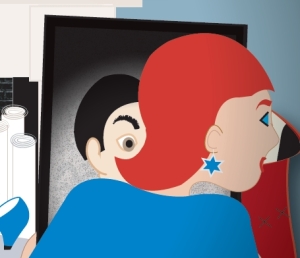
A Lady Desires a Painting
Artwork by Christine Soltys
For the many who have asked, Ashlynn Acosta will be making her second appearance as the intuitive teen sleuth in Too Much of a Good Thing, a young adult mystery novel set in Gloucester, Massachusetts. In the intriguing story, our heroine deals with issues of hoarding, ownership, greed and possessiveness that lead to a crime.
The problematic relationship with her single dad, a “just the facts” police detective, has healed through the challenges met and shared in Dead Men Do Tell Tales. Relishing this lively new connection with her dad, Ashlynn suspects any woman seriously claiming her father’s attention. When a beautiful redhead enters the scene, Ashlynn faces the need to solve a mystery in the midst of a budding romance between her father and this most surprising lady. Pressure builds when her buddy group divides into romantic couples and she is paired with a guy who evokes new feelings in her! She is overwhelmed by it all.
Ashlynn’s very first date takes place as she tries to uncover the real mystery in the midst of too much of too many good things. Intuition and real dreamwork are the tools Ashlynn uses to help her understand and act on her new feelings as well as unravel the secrets in a mansion on a hill where a rich old lady has been found dead.
In a Reader’s Guide at the end of the novel, you can learn more about the intuitive tools Ashlynn uses and learn how they can be employed to unlock your own mysteries and solve your own problems.


By: frankramer,
on 9/12/2014
Blog:
(
Login to Add to MyJacketFlap)
JacketFlap tags:
Uncategorized,
teenagers,
teen,
dream,
Massachusetts,
intuition,
teen mystery,
intuitive,
young adult mystery,
Gloucester,
Ashlynn Acosta,
Dead Men Do Tell Tales,
healing dreams,
dream journaling,
On Intuition,
benefits of remembering dreams,
Dreamwork Methods,
Too Much of a Good Thing,
Ashlynn,
Add a tag

A Lady Desires a Painting
Artwork by Christine Soltys
For the many who have asked, Ashlynn Acosta will be making her second appearance as the intuitive teen sleuth in Too Much of a Good Thing, a young adult mystery novel set in Gloucester, Massachusetts. In the intriguing story, our heroine deals with issues of hoarding, ownership, greed and possessiveness that lead to a crime.
The problematic relationship with her single dad, a “just the facts” police detective, has healed through the challenges met and shared in Dead Men Do Tell Tales. Relishing this lively new connection with her dad, Ashlynn suspects any woman seriously claiming her father’s attention. When a beautiful redhead enters the scene, Ashlynn faces the need to solve a mystery in the midst of a budding romance between her father and this most surprising lady. Pressure builds when her buddy group divides into romantic couples and she is paired with a guy who evokes new feelings in her! She is overwhelmed by it all.
Ashlynn’s very first date takes place as she tries to uncover the real mystery in the midst of too much of too many good things. Intuition and real dreamwork are the tools Ashlynn uses to help her understand and act on her new feelings as well as unravel the secrets in a mansion on a hill where a rich old lady has been found dead.
In a Reader’s Guide at the end of the novel, you can learn more about the intuitive tools Ashlynn uses and learn how they can be employed to unlock your own mysteries and solve your own problems.


By: frankramer,
on 9/10/2014
Blog:
(
Login to Add to MyJacketFlap)
JacketFlap tags:
Edgar Cayce,
dream journaling,
working with dreams,
Déjà vu,
On Dreams,
benefits of remembering dreams,
Dreamwork Methods,
dreamtime,
foreknowledge,
waking reality,
You only live twice,
dreams,
Uncategorized,
dream,
foreshadowing,
experience,
Add a tag

Déjà vu: How could I be here before?
, the experience of already having seen something or visited someplace, is a common experience that modern science cannot explain. For example, I might be traveling in a foreign country, visiting a famous place like the Great Wall of China for the first time. All of sudden I get the feeling I have been here and this place is familiar.
After nearly forty years of recording my dreams, and having so many dreams of being in strange places and meeting new people that become manifest in waking life, I am almost convinced déjà vu is an experience of remembering something or someplace previously seen in dreamtime, and the memory surfaces from the long-forgotten, or possibly never-remembered dream when waking reality mimics the earlier experience in dreamtime. I was first made aware of this dual reality when I was in college and had a dream just after my roommate became engaged.
Dream:
I dream of attending my college roommate’s wedding in a white church I didn’t recognize in waking life. The dream is vivid and clear in every detail, especially the completely white color of church exterior, the unusual reddish brown design inside the church and the fact that I am taken to the church in the groom’s parents’ white car, sitting in the right rear seat.
On waking I completely forgot about the dream because I wasn’t in the habit of recording my dreams at this stage of my life. When the day of the wedding arrived approximately six months later, and we were about to go to the church, I was told to ride in the groom’s parents’ white car. As I looked at the car, I suddenly I recalled the dream and remembered I had seen this before, been here and done this! I got goose bumps. Reality then played out according to my dream. I was told to sit in the right backseat, exactly where I was in the dream. On the way to the church I suspected the church would be all white on the outside and inside would have that unusual reddish brown design. And sure enough, it did.
Déjà vu suggests a Similar Dreamtime and Waking Reality
Edgar Cayce and others have stated that in dreamtime we get a foreshadowing of all the important events in our life before they become manifest in waking life. It is in dreamtime where we make choices that may eventually play out in waking time because dreamtime puts us into the future to prepare the way for us. That is one reason why Casey is quoted as saying “Dreams are today’s answers to tomorrow’s questions.” It’s like we are given a trial run. If we are dream-aware, we can make use of this test case scenario. If not, it’s as if we are programmed to follow through with the same decision in waking life as we made in dreamtime.
Living Twice in this Life
This concept of living our life twice, in dreamtime and waking time, is hinted at in popular culture with the James Bond theme song sung by Nancy Sinatra,
“You only live twice or so it seems
One life for yourself and one for your dreams.”
While some may interpret this to mean we live two different lives, one in our dreams (perhaps daydreams) and one in waking life, and these realities might not necessarily match in quality or enjoyment, my experience indicates that night dreams pretty well do match waking life—unless I consciously NOT make a decision I made in dreamtime because I didn’t like the outcome I saw in the dream. However, this type of decision-making requires knowing what was dreamed about and remembering it, perhaps many years after the dream! To me, this is what is meant by getting answers about the future from the dream. If you liked the outcome of your choice in dreamtime, go with it. If not, make another choice.
So the next time you experience déjà vu, consider that you may have passed this way before—in your dreams, and your dreams were preparing you for this experience.


By: frankramer,
on 9/10/2014
Blog:
(
Login to Add to MyJacketFlap)
JacketFlap tags:
Add a tag

Déjà vu: How could I be here before?
, the experience of already having seen something or visited someplace, is a common experience that modern science cannot explain. For example, I might be traveling in a foreign country, visiting a famous place like the Great Wall of China for the first time. All of sudden I get the feeling I have been here and this place is familiar.
After nearly forty years of recording my dreams, and having so many dreams of being in strange places and meeting new people that become manifest in waking life, I am almost convinced déjà vu is an experience of remembering something or someplace previously seen in dreamtime, and the memory surfaces from the long-forgotten, or possibly never-remembered dream when waking reality mimics the earlier experience in dreamtime. I was first made aware of this dual reality when I was in college and had a dream just after my roommate became engaged.
Dream:
I dream of attending my college roommate’s wedding in a white church I didn’t recognize in waking life. The dream is vivid and clear in every detail, especially the completely white color of church exterior, the unusual reddish brown design inside the church and the fact that I am taken to the church in the groom’s parents’ white car, sitting in the right rear seat.
On waking I completely forgot about the dream because I wasn’t in the habit of recording my dreams at this stage of my life. When the day of the wedding arrived approximately six months later, and we were about to go to the church, I was told to ride in the groom’s parents’ white car. As I looked at the car, I suddenly I recalled the dream and remembered I had seen this before, been here and done this! I got goose bumps. Reality then played out according to my dream. I was told to sit in the right backseat, exactly where I was in the dream. On the way to the church I suspected the church would be all white on the outside and inside would have that unusual reddish brown design. And sure enough, it did.
Déjà vu suggests a Similar Dreamtime and Waking Reality
Edgar Cayce and others have stated that in dreamtime we get a foreshadowing of all the important events in our life before they become manifest in waking life. It is in dreamtime where we make choices that may eventually play out in waking time because dreamtime puts us into the future to prepare the way for us. That is one reason why Casey is quoted as saying “Dreams are today’s answers to tomorrow’s questions.” It’s like we are given a trial run. If we are dream-aware, we can make use of this test case scenario. If not, it’s as if we are programmed to follow through with the same decision in waking life as we made in dreamtime.
Living Twice in this Life
This concept of living our life twice, in dreamtime and waking time, is hinted at in popular culture with the James Bond theme song sung by Nancy Sinatra,
“You only live twice or so it seems
One life for yourself and one for your dreams.”
While some may interpret this to mean we live two different lives, one in our dreams (perhaps daydreams) and one in waking life, and these realities might not necessarily match in quality or enjoyment, my experience indicates that night dreams pretty well do match waking life—unless I consciously NOT make a decision I made in dreamtime because I didn’t like the outcome I saw in the dream. However, this type of decision-making requires knowing what was dreamed about and remembering it, perhaps many years after the dream! To me, this is what is meant by getting answers about the future from the dream. If you liked the outcome of your choice in dreamtime, go with it. If not, make another choice.
So the next time you experience déjà vu, consider that you may have passed this way before—in your dreams, and your dreams were preparing you for this experience.


By: frankramer,
on 9/3/2014
Blog:
(
Login to Add to MyJacketFlap)
JacketFlap tags:
dreams,
Uncategorized,
dreamwork,
working with dreams,
On Dreams,
Dreamwork Methods,
dream is about the dreamer,
Fritz Perls,
meanings of dreams,
Add a tag

A Dream Scene: Hopes Rising or a Plane Taking Off?
In working with dreams, there are two common misleading inclinations most people have: they tend to see events in dreams to be literally true or to view them as happening outside the dreamer as actual events in waking life. Perhaps this is because many people tend to find ultimate meaning outside themselves rather than looking within for the answers. Here is an example:
Dream: I am in a plane that is taking off from a bumpy runway. The plane is bouncing around and it makes me nervous.
In this case, the dreamer might think the dream refers to a plane ride he might be taking tomorrow or sometime in the future and the takeoff could be hazardous. While that might be one possible interpretation, leaving it there without further reflection will quite often miss the mark, losing a much more important meaning of the dream altogether.
One of the major milestones for dreamworkers in learning about dreams is to realize that the dream is about the dreamer and what is going on within the dreamer. That is why dreams have been called the Royal Road to the Unconscious. Genuine dreamwork takes us on this royal road. It provides ways to understand and nurture a deeper relationship with one’s own Self. Fortunately, nowadays, dreamwork methods have been developed to help us mine the hidden meanings of dreams which pertain to what is happening within the Unconscious regions the dreamer. One of these established methods for working with dreams is Fritz Perls’ approach of viewing everything in the dream as part of the dreamer.
How to Work with the Dream as if it was “All About Me”
In this approach, I would work with the dream about a plane taking off from a bumpy runway as follows: I would ask myself what part of me represents the plane, what part represents the runway, and what is “bouncing around” in my life? I might associate the plane with my hopes for a new project that is taking off in my life, I might associate the bumpy runway with the bumpy start of the project and the “bouncing around” may stand for my feelings about the whole affair. In this case, my unsteady feelings are challenging the hopes for something developing in my life. For me to move forward in a healthy manner, perhaps the dream is helping me by warning me that I need to pay attention to this project and to my feelings about it—or a disaster could result and I may have many regrets about being part of the project. The dream, then, is calling my attention to a real problem in my waking life right now and not some possible future development. It is saying that within me there is a growing unease about this project.
Sometimes dreams do concern events outside the dreamer but most of the time my experience has been that dreams are always about the dreamer so while dreams may pertain to outside events, they also suggest a parallel metaphor within the dreamer—and this issue is often the difficult one to deal with, and the one most overlooked by the dreamer.


By: frankramer,
on 9/3/2014
Blog:
(
Login to Add to MyJacketFlap)
JacketFlap tags:
Add a tag

A Dream Scene: Hopes Rising or a Plane Taking Off?
In working with dreams, there are two common misleading inclinations most people have: they tend to see events in dreams to be literally true or to view them as happening outside the dreamer as actual events in waking life. Perhaps this is because many people tend to find ultimate meaning outside themselves rather than looking within for the answers. Here is an example:
Dream: I am in a plane that is taking off from a bumpy runway. The plane is bouncing around and it makes me nervous.
In this case, the dreamer might think the dream refers to a plane ride he might be taking tomorrow or sometime in the future and the takeoff could be hazardous. While that might be one possible interpretation, leaving it there without further reflection will quite often miss the mark, losing a much more important meaning of the dream altogether.
One of the major milestones for dreamworkers in learning about dreams is to realize that the dream is about the dreamer and what is going on within the dreamer. That is why dreams have been called the Royal Road to the Unconscious. Genuine dreamwork takes us on this royal road. It provides ways to understand and nurture a deeper relationship with one’s own Self. Fortunately, nowadays, dreamwork methods have been developed to help us mine the hidden meanings of dreams which pertain to what is happening within the Unconscious regions the dreamer. One of these established methods for working with dreams is Fritz Perls’ approach of viewing everything in the dream as part of the dreamer.
How to Work with the Dream as if it was “All About Me”
In this approach, I would work with the dream about a plane taking off from a bumpy runway as follows: I would ask myself what part of me represents the plane, what part represents the runway, and what is “bouncing around” in my life? I might associate the plane with my hopes for a new project that is taking off in my life, I might associate the bumpy runway with the bumpy start of the project and the “bouncing around” may stand for my feelings about the whole affair. In this case, my unsteady feelings are challenging the hopes for something developing in my life. For me to move forward in a healthy manner, perhaps the dream is helping me by warning me that I need to pay attention to this project and to my feelings about it—or a disaster could result and I may have many regrets about being part of the project. The dream, then, is calling my attention to a real problem in my waking life right now and not some possible future development. It is saying that within me there is a growing unease about this project.
Sometimes dreams do concern events outside the dreamer but most of the time my experience has been that dreams are always about the dreamer so while dreams may pertain to outside events, they also suggest a parallel metaphor within the dreamer—and this issue is often the difficult one to deal with, and the one most overlooked by the dreamer.


By: frankramer,
on 8/27/2014
Blog:
(
Login to Add to MyJacketFlap)
JacketFlap tags:
dreams,
Uncategorized,
dream,
Healing,
health information,
dream journal,
healing dreams,
dream journaling,
working with dreams,
On Dreams,
benefits of remembering dreams,
Dreamwork Methods,
dream healing,
asclepion,
Asclepius,
health benefits of dream journaling,
caduceus,
Rod of Asclepius,
Add a tag

Caduceus: The Healing Rod of Asclepius
With nearly 40 years of dreamwork experience, one thing I can say for certain about my dreams is that the archetypal energy of healing at all levels, spiritual, psychological and physical has been expressed in myriad symbols, processes and themes, indicating to me that the primary purpose of dreams is to heal and make whole.
The Benefits of Working with Dreams to Heal
Learning to recognize when and how healing is at work within is a fascinating aspect of the study of dreams. It was one of the first benefits I clearly saw from keeping a dream journal. (See my blog 6 Health Related Benefits of Keeping a #Dream Journal.) As I grew more adept at working with dreams, I learned that they could be used to diagnose, treat and monitor the progress of any kind of ailment. Over the years, I learned to request information about a piece of health information prior to getting the specific lab results to verify the accuracy of that test. I have found my dreams to be up to this point in time 100% accurate and I have been doing this for more than ten years. And last but not least, I saw healings take place within my dreams which then manifested in my body.
How to Become Adept at Working with Health-Related Dreams
If you want to become adept at exploring your health from the dream perspective, do the following:
- Keep a dream journal and be faithful in recording all the dreams you can remember, even the most minor and insignificant. Many years ago I had an obscure “one-liner” dream which conveyed the cryptic message, “Everyone is working to develop a method of self-healing.” I knew nothing of what this meant at the time but many years later, I saw it would become one the main purposes of my life, and “everyone” referred to all aspects of me!
- Read the groundbreaking book by Patricia Garfield, Ph.D., The Healing Power of Dreams, which gives researched information on how symbols occurring in dreams relate to the body and its state of health. She gives many of the commonly occurring symbols for health in dreams.
- In addition the to common symbols for health and healing; learn your personal dream vocabulary. (See Recognizing Your Personal Dream Vocabulary.) What are your unique symbols for health, healing and healers that appear in your dreams?
- Notice and reflect on all images, processes and symbols relating to health, the medical field, therapists and healers. What are they telling you?
- Learn to request specific health information from dreams (Dream Incubation.) (See Ask and You Shall Receive: Incubating a #Dream.) For example, ask what particular foods do you need to eat to get healthier?
- Request healings to come in dreams.
- Test your dream findings with your medical lab tests or a doctor’s diagnosis. If your dream tells you one thing, and a doctor another, get a second opinion.
Many doctors now are beginning to see the helpfulness of dreams in staying healthy. My doctor always takes my health dreams seriously and so should yours! Hippocrates, the father of modern medicine, is said to have learned about the value of dreams and their relationship to health at an asclepion, an ancient type of hospital which was dedicated to the god of healing, Asclepius. The caduceus, the symbol of medicine which comes to us from this ancient era, depicts snakes wrapped around the rod of Asclepius.


By: frankramer,
on 8/27/2014
Blog:
(
Login to Add to MyJacketFlap)
JacketFlap tags:
Add a tag

Caduceus: The Healing Rod of Asclepius
With nearly 40 years of dreamwork experience, one thing I can say for certain about my dreams is that the archetypal energy of healing at all levels, spiritual, psychological and physical has been expressed in myriad symbols, processes and themes, indicating to me that the primary purpose of dreams is to heal and make whole.
The Benefits of Working with Dreams to Heal
Learning to recognize when and how healing is at work within is a fascinating aspect of the study of dreams. It was one of the first benefits I clearly saw from keeping a dream journal. (See my blog 6 Health Related Benefits of Keeping a #Dream Journal.) As I grew more adept at working with dreams, I learned that they could be used to diagnose, treat and monitor the progress of any kind of ailment. Over the years, I learned to request information about a piece of health information prior to getting the specific lab results to verify the accuracy of that test. I have found my dreams to be up to this point in time 100% accurate and I have been doing this for more than ten years. And last but not least, I saw healings take place within my dreams which then manifested in my body.
How to Become Adept at Working with Health-Related Dreams
If you want to become adept at exploring your health from the dream perspective, do the following:
- Keep a dream journal and be faithful in recording all the dreams you can remember, even the most minor and insignificant. Many years ago I had an obscure “one-liner” dream which conveyed the cryptic message, “Everyone is working to develop a method of self-healing.” I knew nothing of what this meant at the time but many years later, I saw it would become one the main purposes of my life, and “everyone” referred to all aspects of me!
- Read the groundbreaking book by Patricia Garfield, Ph.D., The Healing Power of Dreams, which gives researched information on how symbols occurring in dreams relate to the body and its state of health. She gives many of the commonly occurring symbols for health in dreams.
- In addition the to common symbols for health and healing; learn your personal dream vocabulary. (See Recognizing Your Personal Dream Vocabulary.) What are your unique symbols for health, healing and healers that appear in your dreams?
- Notice and reflect on all images, processes and symbols relating to health, the medical field, therapists and healers. What are they telling you?
- Learn to request specific health information from dreams (Dream Incubation.) (See Ask and You Shall Receive: Incubating a #Dream.) For example, ask what particular foods do you need to eat to get healthier?
- Request healings to come in dreams.
- Test your dream findings with your medical lab tests or a doctor’s diagnosis. If your dream tells you one thing, and a doctor another, get a second opinion.
Many doctors now are beginning to see the helpfulness of dreams in staying healthy. My doctor always takes my health dreams seriously and so should yours! Hippocrates, the father of modern medicine, is said to have learned about the value of dreams and their relationship to health at an asclepion, an ancient type of hospital which was dedicated to the god of healing, Asclepius. The caduceus, the symbol of medicine which comes to us from this ancient era, depicts snakes wrapped around the rod of Asclepius.


By: frankramer,
on 8/20/2014
Blog:
(
Login to Add to MyJacketFlap)
JacketFlap tags:
dreams,
Uncategorized,
meditation,
Energy,
intuitive,
energy healing,
energy field,
characteristics of intuition,
faith healing,
healing dreams,
On Intuition,
Intuitive Methods,
intuitive healing,
Energy Fields,
human energy field,
Add a tag

A Connection of Energy Fields
From Asian cultures we learn that the body is essentially an energy field connected directly or indirectly to all other energy fields in the universe. Because all fields are interconnected, they are capable of transferring information and energy. That means we have access to an infinite amount of information. We are all aware of how we receive and send information through the five senses of taste, touch, smell, sight and hearing. But what about the so-called sixth sense?
Receiving and Sending Intuitive Information and Energy
Many of us are not so aware how we can send and receive information and energy through intuition in the form meditation and dreams. The intuitive images, sounds, feelings, and sensations that we pick up spontaneously or receive in dreams and meditation are identifying symbols for unique, relevant information and energy within and without us that can be used to help ourselves and others. Any of the senses can be a vehicle for an intuitive message because our bodies are wonderfully designed to transmit information through the five senses as well as the sixth sense of intuition. Just as we pick up data through touch, sight, hearing, smell and taste coming from outside us, we can register intuitive data coming from within us through those same senses.
Sending intuitive information and loving energy is very much like using our senses to send and receive information about what we see or hear except we do it in an intuitive, altered state of awareness such as meditation, deep prayer or dreams. In these states we intend to receive or to transmit information or energy, and it happens! We can intend to have dreams that will help someone else by giving deeper understanding, clues to resolution or a diagnosis of the issue. While in meditation or prayer, we can send healing energy and even information to someone through the imagination and intention.
When you think of the body as a bundle of energy in addition to it’s amazing physical capabilities, it is truly amazing.


By: frankramer,
on 8/20/2014
Blog:
(
Login to Add to MyJacketFlap)
JacketFlap tags:
Add a tag

A Connection of Energy Fields
From Asian cultures we learn that the body is essentially an energy field connected directly or indirectly to all other energy fields in the universe. Because all fields are interconnected, they are capable of transferring information and energy. That means we have access to an infinite amount of information. We are all aware of how we receive and send information through the five senses of taste, touch, smell, sight and hearing. But what about the so-called sixth sense?
Receiving and Sending Intuitive Information and Energy
Many of us are not so aware how we can send and receive information and energy through intuition in the form meditation and dreams. The intuitive images, sounds, feelings, and sensations that we pick up spontaneously or receive in dreams and meditation are identifying symbols for unique, relevant information and energy within and without us that can be used to help ourselves and others. Any of the senses can be a vehicle for an intuitive message because our bodies are wonderfully designed to transmit information through the five senses as well as the sixth sense of intuition. Just as we pick up data through touch, sight, hearing, smell and taste coming from outside us, we can register intuitive data coming from within us through those same senses.
Sending intuitive information and loving energy is very much like using our senses to send and receive information about what we see or hear except we do it in an intuitive, altered state of awareness such as meditation, deep prayer or dreams. In these states we intend to receive or to transmit information or energy, and it happens! We can intend to have dreams that will help someone else by giving deeper understanding, clues to resolution or a diagnosis of the issue. While in meditation or prayer, we can send healing energy and even information to someone through the imagination and intention.
When you think of the body as a bundle of energy in addition to it’s amazing physical capabilities, it is truly amazing.


By: frankramer,
on 8/13/2014
Blog:
(
Login to Add to MyJacketFlap)
JacketFlap tags:
dreams,
Uncategorized,
dream,
Energy,
theology,
intuition,
religion and science,
science and religion,
Intuition in the Book of Luke,
On Intuition,
On Dreams,
e=mc²,
liberation theology,
Pierre Teilhard de Chardin,
theological development,
theology of energy,
Thomistic theology,
Add a tag

Harnessing the Energy of Love
“Someday, after mastering the winds, the waves, the tides and gravity, we shall harness for God the energies of love, and then, for a second time in the history of the world, man will have discovered fire.”
– Pierre Teilhard de Chardin
Reading this quote this morning made me more aware that a future direction of Christian theological reflection will be, as it is in physics and medicine, on the nature of energy. Energy is what underlies everything. Energy is what make the universe tick (e=mc²), energy is what gives life to the body and creates abundant health, and energy is the active component of both intuition and love.
I personally believe that as we explore the depths of human intuitive capabilities as they are grounded in empathetic love rather than in the showy but superficial distractions of ESP and some other extraneous psychic phenomenon, we will rewrite a new theology. Just as Thomistic theology and liberation theology represent significant philosophical and political points of view, I believe there will be a Christian theology of energy that may one day unite religion and science. Developing intuition and observing nature as concurrent and equally important tasks, along with being inspired by revelation, will be the keys for this unfolding.
Everything we have ever learned and will learn will come through our marvelous bodies which are receptors and communicators of healing energy. As humans we also have the ability to observe and reflect upon that energy and how it works, especially through intuition and dreams. They tap us into the universal power source and inform of us of this underlying energy that drives us both as individuals and as beings who are connected with every other being in the universe. Our challenge will be to integrate our new understandings of energy, especially the healing and loving kind, with divine revelation. Just as we have learned to harness atomic power, I do hope we learn to harness the power of intuition and dreams and use the insight we gain in the service of love. Then, we will have harnessed an exponentially greater fire than our ancestors did.


By: frankramer,
on 8/13/2014
Blog:
(
Login to Add to MyJacketFlap)
JacketFlap tags:
Add a tag

Harnessing the Energy of Love
“Someday, after mastering the winds, the waves, the tides and gravity, we shall harness for God the energies of love, and then, for a second time in the history of the world, man will have discovered fire.”
– Pierre Teilhard de Chardin
Reading this quote this morning made me more aware that a future direction of Christian theological reflection will be, as it is in physics and medicine, on the nature of energy. Energy is what underlies everything. Energy is what make the universe tick (e=mc²), energy is what gives life to the body and creates abundant health, and energy is the active component of both intuition and love.
I personally believe that as we explore the depths of human intuitive capabilities as they are grounded in empathetic love rather than in the showy but superficial distractions of ESP and some other extraneous psychic phenomenon, we will rewrite a new theology. Just as Thomistic theology and liberation theology represent significant philosophical and political points of view, I believe there will be a Christian theology of energy that may one day unite religion and science. Developing intuition and observing nature as concurrent and equally important tasks, along with being inspired by revelation, will be the keys for this unfolding.
Everything we have ever learned and will learn will come through our marvelous bodies which are receptors and communicators of healing energy. As humans we also have the ability to observe and reflect upon that energy and how it works, especially through intuition and dreams. They tap us into the universal power source and inform of us of this underlying energy that drives us both as individuals and as beings who are connected with every other being in the universe. Our challenge will be to integrate our new understandings of energy, especially the healing and loving kind, with divine revelation. Just as we have learned to harness atomic power, I do hope we learn to harness the power of intuition and dreams and use the insight we gain in the service of love. Then, we will have harnessed an exponentially greater fire than our ancestors did.


View Next 25 Posts


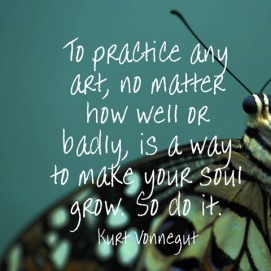
























Hi Fran,
This post makes much sense to me. Years ago, I used to have many nightmares of men chasing me. When they did catch up with me, there was often a threat of violence with either a gun or a knife being aimed at me. Once or twice I was shot in the dream, waking up at that moment horrified.
In the midst of working with an analyst, the dreams slowly started to change becoming more benign and eventually I began to have very loving dreams with my dream men.
Debra
Thank you for your sharing. I posted the comment minus a last sentence which I thought was for me only. If you want me to not post your comment as is I will take it down completely. Many of my dream experiences with men other than my father were so worked related and often were tied in with how well I was treated by men on the job!
That’s fine Fran. Whatever you think is appropriate.
Thank you.
Debra